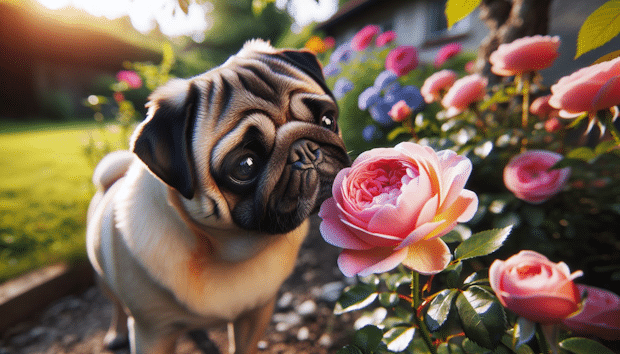Spring is in the air, and your yard is practically begging for a green makeover. Before you dive headfirst into planting paradise, however, let’s talk about our four-legged friends. Pets don’t just smell the roses, they eat them. Which plants are a big “no-no,” and which ones are safe for our fur babies?
Pet-friendly plants:
We did the research to find the list of plants that are considered pet friendly. Here are some of the most popular options for your garden.
- Camellias are flowering shrubs with pretty blooms. They are perennials, and once established will come back again and again. These plants prefer shade, and once established need little care.
- Cat grass is great for digestion, and cats love it. This is an annual plant that you can put directly in your garden, after the frosty season has passed. Most likely you’ll grow I from seed. Make sure you watch for weeds and pests, both of which are common outdoors.
- Coral bells feature small sprigs of tiny flowers on long stems. Their leaves also are colorful and can come in shades from green to orange and black.
- Fuchsias have beautiful pink and purple blooms that look great in hanging baskets. They bloom from spring to late fall.
- Marigolds are colorful annuals that act as a type of natural pest control. They keep beetles and other bugs away, while also attracting bees.
- Purple basil plants add vibrant color to your garden and, as a bonus, can be harvested and used in your favorite pesto recipe. They prefer a sunny spot and need plenty of water.
- Snapdragons are beautiful additions to your garden with their range of colors on tall stems. They do best in full sun.
- Sunflowers come in a variety of sizes and colors. They can grow several feet tall for a dramatic effect. Plus, the seeds attract birds throughout the fall.
- Zinnias come in many colors including purple, white, yellow, orange, pink, red, and even green. You will love that they attract butterflies to your garden.
Spring is for outdoor gardening, but don’t forget that there are many pet-friendly house plants too.
Plants dangerous to pets:
There are hundreds of problematic plants — too many to list in a single blog. We’ve compiled a list of some common ones you might already have in your garden. After all, you didn’t know until now that they could be harmful. Before you plant anything new or unfamiliar, do your research to ensure it’s safe for your pet.
- Azaleas can cause stomach upset, heart issues, and seizures. Eating azaleas can be fatal without treatment.
- Daffodils can cause severe vomiting and diarrhea, low blood pressure, and heart arrhythmias. In addition, the sharp calcium oxalate crystals contained in daffodils also can cause irritation of the tongue, mouth, and throat. Even drinking water from a vase filled with daffodils is dangerous.
- Foxglove can cause nausea, vomiting, an irregular slow pulse, tremors, and bloody diarrhea. This can be life-threatening.
- Hyacinth can cause intense vomiting, bloody diarrhea, and tremors. The bulbs include toxic calcium oxalate crystals which pierce a pet’s sensitive mouth and the inside of the intestines. The result could be severe intestinal damage.
- Lilies can cause kidney failure in cats. They are also somewhat toxic to dogs, causing upset tummies.
- Morning glory can cause vomiting, diarrhea, tremors, rapid heartbeat, and liver failure. The seeds are the most toxic part of the plant, and ingesting a large amount may cause hallucinations.
- Rhododendrons are related to azaleas and have similar effects, including stomach upset, heart issues, and seizures. They can be fatal if eaten.
- Tomato plant leaves are full of solanine, which can cause nausea, vomiting, and a slow heart rate.
- Tulips can cause vomiting and diarrhea, abdominal pain, tremors, and even coma. Even drinking water from a vase filled with tulips is dangerous.
- If you live in the western part of the U.S., be on the lookout for foxtails, a type of grass-like weed. Not only can they get stuck in your pet’s hair, but they can also work their way up into their nose and ears, causing serious infection and even death.
For added peace of mind, consider pet insurance which can help make treatments more affordable if your fur baby does get into a household danger or outdoor hazard.
Happy Spring and safe gardening!
This article is furnished by California Casualty, providing auto and home insurance to educators, law enforcement officers, firefighters, and nurses. Get a quote at 1.866.704.8614 or www.calcas.com.
- Staying in Control with Driver Assist - February 13, 2026
- Inexpensive Romantic Ways to Say “I Love You” - February 11, 2026
- Foot Care for Nurses - January 30, 2026

